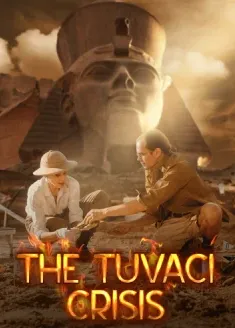
The Tuvaci Crisis
- Genre: Romance
- Status: Completed
- Language: English
- Author: Taylor Brooks
- 6.9KViews
- User Rating 4.4
Chapter 1
[1715 B.C., Egypt]
Shakir studied the temple scribe, trying to decipher if he had missed a message from the gods. It was humid and warm that his white robe hugged his skin due to perspiration, and on his bald head, sweat trickled down to his forehead, fell across his eyes, leaving a peppering sting across his brow, which he briskly wiped off, then it rolled down his cheeks like tears and fell on to his gold chain necklace.
“High Priest,” one of the temple priests said with a worried expression. He had just come from outside the temple, and the sight of the sick outside, mixed with the dead which had started today, was frightening. He didn’t want to go back out there. He wanted to stay here with other priests. At least, he deserved that small level of protection. “They are waiting for you outside the temple.” Perhaps, the High Priest should come and perform some kind of magic to save the people of Egypt.
Shakir glanced at the priest. It was Kaphiri. He returned to the scribe. He had read this scribe over and over again. There was no way he would have missed any prophecy of a plague if truly this disease had come from the gods. But since it wasn’t in the scribes, it made him silently question where it had come from. Whatever struck this way always came from the gods. Amon-Re, Re, Osiris, Isis, Horus, Ptah, and Anubis, who was responsible?
Could it be Anubis? As stated by the scribe, he wasn’t one of Egypt’s important deities. Was he trying to have a silent battle to either punish or win over the people of Egypt by making them sick? If so, he was only creating fear, and he wasn’t doing anything to ease their fears. It was wrong. He hoped one of the gods put up with Anubis and hold him accountable. If he was at fault, that is.
“Keep them away from the temple,” Shakir warned, “so that they don’t anger the gods.” But would the people so much as care about that right now? He should be careful not to make empty threats. For all he knew, they were pretty much helpless against that many sick people. Besides, the way they were, they were gradually beginning to lose strength.
“They are too many, High Priest.”
Just what he feared. As of when he had last seen them, they were about ten, and he had thought their state to be sorry. But since he looked carefully and felt it was a plague, he checked the scribes but saw nothing condemning them at all. They had done nothing to incur the wrath of the gods. Or was he missing something? Was this the strange workings of another god? If so, then it wouldn’t be in the prophecy, and he surely would have totally missed it. And also, he wouldn’t know what to do. But was it really, though?
“I said keep them away. Troops from the palace will be here soon. I’ve written to Pharaoh. He knows about the plight of his people, and he knows what I’m doing to manage it.” Yes. He had prayed and bowed before each of the gods individually, hoping for them to hear him. “Don’t let them touch you. And all those who seemed healthy that brought them, don’t let them leave. Call forth the physicians. I will need all the help I can get.”
Kaphiri left and went to do as he was bid, fearing for his life and knowing fully well that disobedience to the High Priest would invite swift death.
As for Shakir, he kept looking, hoping to see that sentence or word that he may have missed, but he found nothing. He went through a few more scribes, but he still found nothing about a plague, a disease, or punishment. All the great plagues had been prophesied or talked about, and most of them had already happened. He was certain that he would see none in his time as High Priest. After all, his father had raised him for this job. It was unfair having to face something like this unprepared, especially something without a face or a form.
The gods had formed, and they all had faces. It was how he was able to identify with each one.
Shakir got out more scribes and perused briefly over and over again through some of them he had seen, and still, he saw nothing. He fell before the statue of Amon-Re, and Amon-Re said nothing, he worshiped Re, and this he did for Osiris, Isis, Horus, and Ptah, as he muttered words of prayer and bowed to each one.
He begged and cried for mercy. He burned incense, made chants, and was so close to making this a full temple ceremony with the beautifully adorned ladies playing on their little harps and with him changing the clothes of the gods. But he had already cleaned and changed the dresses of the gods today. Did they not approve of their clothing?
Sometimes, to Shakir, it felt like the gods were alive within each statue. Some days, he half expected the statues to move or say something. If there was any day he wanted that, today was the day, and he did so more than ever.
Pharaoh owned Egypt, but even Pharaoh wasn’t above the gods.
If a god was responsible for this, he prayed that Re would find out which god was responsible and have him or her punished or cause him or her to change theirs.
“Please, don’t let your people die,” Shakir prayed.
He had offered meals to the gods. He had fed them, even though their plates looked cold and untouched like every other day. It wasn’t yet time to change the meals. Or was it something else? What more did they want? And why couldn’t they see that all they needed to do was talk to him, and he would do anything for them? Why didn’t they just see and know this fact? Was it so hard for them? Or did they hate the fact that a human fed them every day, or was it because they needed a bit of their freedom? Or, these statues, was there more to them?
Did some god or man in the past imprison them within these statues, and they wanted to be back in human form?
For all he had been told, they just needed a physical form for them to be worshiped, and had the right sculptures been carved, or...
Shakir was beginning to run out of possibilities and what to think. He hated being helpless. He hated it so much.
Egypt was blessed. Or it used to be.
The gods, years back, had led them to find a small mine of some kind of rare earth metal called Crystallon. It looked like a soft silvery s******** that turned to gold once set in the flames. Then, it could be shaped into whatever man wanted. Right where it was deposited by nature, there graced diamonds, emeralds, and all kinds of earthly minerals unknown to man. And these and more were one of the great sources of Egypt’s wealth.
It was so costly and well-valued that it turned out to be more expensive than any diamonds. They traded most of it for riches, and also, Pharaoh’s ruling scepter had been made out of it to show the world that they had what no other nation had, as whatever Crystallon there was, they were the source of it.
At first, when Shakir had gone to pray to the gods and thank them for this, a thought had come to him that what if the Crystallon was a curse instead of a blessing?
Nations fought over gold and diamonds. Why not Crystallon?
Seeing how priced it was, Shakir had advised Pharaoh to put Egypt’s troops on high alert and to employ mercenaries to discourage an attack, and it had worked. So many kings had fought each other around them for land, water, resources buried within the ground, and diamonds, especially diamonds, as so many of them were obsessed with them. But no attack reached Egypt’s borders. They came close, but no king dared cross.
The hasty thumping of footsteps echoed in the temple, announcing more than one person, and Shakir rose to his feet. He turned to see three generals of Egypt well adorned in gold armor, with guards behind them.
“General Usi, General Haji, and General Ahmad, welcome,” Shakir said with a grin on his face. At last, Pharaoh’s troops had arrived. If his generals were here, then they must have come with more than enough troops. Shakir could picture them in his mind outside, on their chariots, pointing silver-tipped spears, and aiming arrows to keep everyone who didn’t want to die a sudden death, back.
“The king briefed us,” General Usi said. “Your warning came a bit too late. It had already reached the palace and affected some of the king’s servants. Thankfully, the gods were merciful, for none of them served the king today.”
Shakir exhaled, not realizing he had been holding his breath. Seeing how aware they were, surely, they would have told their soldiers to distance themselves from the sick and the dead.
“It’s all over the nation,” General Haji said. “We have dispatched our troops to try to calm things.”
“For short,” General Ahmad said, “Pharaoh has declared a military state. No one is to leave their homes.”
“And these people at the temple?” Shakir asked, fearing for his life since it made him so close to whatever this was. “They are the king’s people. Surely, they should spend their last moments with their families.” It would paint to be considerate for them, but really, he would have done anything to distance himself from those dying groans.
“With whatever this is,” said General Ahmad, “they don’t have a choice but to remain here. Our men will protect the temple so that no sick person will get in.”
“You can’t tell who is sick and who isn’t, General Ahmad,” Shakir said. “You shouldn’t let anyone in at all.”
“Have the gods said anything?” asked General Usi, a hopeful look on his face. He believed in all the gods, and from the looks of things, he too was hoping this wasn’t a plague from the great protectors of Egypt.
Shakir’s cheek flushed with embarrassment as he turned to look at the statue of Re. It was a tricky question. What was he to say to soothe Usi’s mind? “They remain silent,” he said. They always spoke to him through signs, but he felt nothing, save for that northern breeze that touched his face when he had initially fallen on his knees to pray. It was easy to kneel before the gods. Kneeling before stones. It made Shakir feel small. At least, these stones, if they were just that and not gods at all, would still very much remain right after he was gone. Age may c**** and dent them, but they would remain until some other Pharaoh orders the renewal of their statues.
“The temple has been surrounded,” General Haji said. “We are not to let anyone in or out till we know what this is.”
Shakir nodded. That was good. Now, he was to be a prisoner in this temple. Well, best here than anywhere, for right here, he was closer to the gods. Besides, he had no desire to go anywhere, so why not here. “Have you sent men to investigate?”
“Yes,” General Ahmad said. “Soon, we would hear words.”
Time stretched, and the air grew heavy and tense with the wailing outside. Every man within the temple pondered about their life and how they could be like the next person outside. It made them strongly think about what to do, with helplessness written across their faces, for deep down, none of them could do anything but either wait for intervention from the gods or the physicians.
And no matter how Shakir was pleased with the company of the king’s generals, he wished he could be with the priests to further assure them. Or, on second thought, he was pleased he wasn’t with them. They would require words of comfort from him in these trying times, and since the gods didn’t speak, what was he to say that would be encouraging enough?
Just what was he to say to them? Being the High Priest was a high honor. It made everyone wish to be like him, for he always had the ears of Pharaoh, and he could give advice and be certain that Pharaoh would heed his words. But sometimes, the task placed on him... he was to be the mouthpiece of the gods. What he said had to always be considered.
But what happened when the gods said nothing? How then should he respond? Should he prophesy of his own accord, without direction? He could blunder, and if there was anything he feared, it was a disgrace and the silence of the gods. Sometimes, he learned, the gods spoke in silence, but in that silence, Shakir’s main fear was them not acting at all.
The doors opened, allowing a large portion of light inside. An awestruck Shakir turned, afraid to see an army of sick people barging their way in, but it was only a soldier in gleaming silver armor, walking with pride to report to his generals who now lined up to receive it.
On reaching the generals, the soldier fisted a hand and placed it against his chest, and with a leg stretched back, he bowed his head, which was the custom of greeting one’s superiors.
“Speak,” General Haji ordered.
They all feared the worst, but none more than Shakir feared a situation of no result.
The soldier stood at ease and looked worried, for he was wondering just how to start.
“So, what have you discovered?” General Usi pressed.
“It came in through the sea,” the soldier said, “and from the eyes of witnesses, it first started from the harbor. No one knew what it was when the first man dropped dead. People rushed to help, and all those who helped soon died, and those who helped as well... It is obtained from contact with another person. It would seem that all those who decided to give a hand to the sick are dead.”
Shakir’s inside flipped. He tried to recall if anyone had touched him today or if he had touched anything from outside the temple or within. His stomach groaned, and he recalled that after his bath, he had come here to sacrifice, clean, and feed the gods, and he had been here all morning till the cries had begun outside. He was safe, or so he tried to convince himself, but fear was a visible expression on his face. For now, he was okay, but how long was he to feel so before he joined the gods? Also, how long would the gods be quiet about it? What was this sickness?
“The tuvaci,” General Ahmad said as if prompted to with his face down to the floor. Like most generals, he had fought for Egypt abroad, so he had met too many people. “That’s what it is called. I have encountered someone with it once in Assyria. I know it looked familiar. I just wasn’t sure, and mostly, I was scared of giving this a false report.”
Just then, the chief physician entered, having been earlier summoned by Shakir, the High Priest, and the first thing Shakir asked, instead of going to kiss him on both cheeks, was.
“Have you found a cure?” Also, he refrained from kissing the chief physician on both cheeks, which he would have on any normal day, only today did not feel or look like a normal day. However, he hoped that the chief physician would understand. And it seemed he did, for he too stood five meters apart from the generals.
Then, Shakir thought about his wife, and his heart slammed hard against his chest. Had she been out today? When his sexual urges came tonight like they did every other night, was he to avoid her because he didn’t want to get this silent killer? She was his wife. Surely, Naima didn’t go out today. And his son... There was so much to worry about, and he was sad that he had just thought about them.
Perhaps, he had been so worried about trying to get an answer from the gods that he had not thought to consider his family. His wife loved him for his devotion to the gods. However, sometimes, she wished he was there for them. And just like now, he hadn’t been there for them.
The chief physician shook his head. “The healing shelter is filled with the same cases. We had to evacuate earlier patients so that they wouldn’t get infected. They are all dying. They are groaning and dying of a fever so high. Many of my physicians are sick having contacted this because they had worked unprotected. I feel so lost. What is this?”
General Ahmad repeated the name of the chief physician, “It is called tuvaci. Report from the soldier says it started from Avaris.”
“Our harbor?” The chief physician looked down. “Death litters the street. It’s everywhere. What else has been discovered?”
“For all we know,” Shakir, who had silently been listening, said, “it started today, and it’s already all over Egypt.”
“There are nationals from other countries here,” General Usi said. “I hope they won’t use this as a pretext for war to strike us. Egypt may not be able to deal with any strong blows now. At least, the army stands ready, and the mines are well protected.”
“We should be in the palace,” Shakir said. “We should be talking to the king to know his thoughts.” But Shakir knew Pharaoh would want to know his thoughts on this. He wasn’t sure he wanted to disappoint Pharaoh. Perhaps, with the little he knew, he could come up with a new directive from the gods, even though he faked it. At least, it would be for the benefit of all of Egypt, for he couldn’t do much from here now the gods didn’t want to talk to him.
A temple priest approached High Priest Shakir, and fearing the priest would come closer, he raised a hand to signal the priest to a halt.
“What is it?” Shakir asked.
“Dark words from the palace, Your Grace,” the priest said. “Pharaoh is ill.”
Everyone’s eyes lit with surprise.
But the generals had come from the palace. They had been with him for some hours. A word from them was that Pharaoh was okay. What was this? What was happening? ‘Gods of Egypt, please, let it be a normal sickness like dread malaria, for that could be treated,’ Shakir prayed in his mind. ‘Please, let it not be this sickness moving around. Gods of Egypt, please.’
The priest went on, “His bodyguards say it’s like the sickness ravaging the country.”
Shakir felt his heart sink. Alas, it was it. He didn’t believe that it was, or what he was hearing, but it very well seemed like Pharaoh was going to die.
Gods of Egypt, if there was any time to answer, it was now. This was Pharaoh, the first son of Egypt, and the gods. But still, the gods remained silent.
With the others beside him, Shakir turned and looked to the statues for guidance. He spread out both hands and gazed with hope on their sculptured faces, but it seemed all his gods did stand high with pride and look past him. Was it because he wasn’t up to their level?
Shakir gasped and placed a hand on his chest. The pain he felt was like his heart needed massaging. He was too old to be feeling this way. Gods, no. Pharaoh was supposed to outlive him. But now, it seemed it was going to be the other way round.
“How?” Shakir asked. He had to know. He needed to know if not anything else.
“It doesn’t reveal much. It just says to inform you. But so far, the queen, the children, and his relatives have been kept in isolation to be sure they are not also infected.”
“I leave for the palace immediately. Get me twenty temple guards. Now.”
The priest nodded and went to do as he was bid.
Shakir looked at the faces of the generals and the chief physician, and in their eyes was a fear so dense and dark that you could have cut through it with a knife, and to Shakir’s shame, he was afraid too that they were all thinking the same thing.
Pharaoh was going to die.
The temple guards arrived, and Shakir, the generals, and the chief physician all left the temple, which was immediately locked behind them on the orders of Shakir, who ordered that they should let no one in as he didn’t want anyone touching anything, for he had a fear, only he didn’t want to voice it.
It was as if the gods were just now whispering to him, but he didn’t want to believe what was being said, for he wanted to believe that for the sake of Pharaoh, there was going to be a change... some kind of cure. A touch of divinity. And so, he hoped.
There was stillness on the street and silence in broad daylight like Egypt was haunted by the ghosts of the unjustly dead who had died for no reason at all. A light breeze blew, stirring specks of dust into figures of men like apparitions, and even though some walked past the group bound for the palace, it didn’t stop or deter them from continuing their trip.
Shakir would have loved to be within the safety of the temple. Even the generals had earlier said no one was to leave. But now it involved Pharaoh... Now a sickness had called out Egypt’s grand commander, no order would keep them inside. He wanted to walk because most of the chariots in the temple complex would have been touched by the sick and save for the fact this was person-to-person contact... No. It was more. It had to be more.
Else, how would Pharaoh have gotten it? A whole Pharaoh, who everyone who surrounded him was supposed to take extreme precautions with their dealings with him, was affected. How then were he and Pharaoh’s generals still alive? Any of them would have gladly given their lives to make sure Pharaoh lived. But this... Or had the gods been listening all along, and had they prevented him from getting sick? Perhaps. He couldn’t be sure.
There was the thundering of hooves, and Shakir looked to see chariots from the palace on the street, coming fast toward them, leaving a trail of dust in their wake. The riders rode furiously like they were trying to beat time. They made a sharp turn before Shakir and his company, and Shakir recognized them as Pharaoh’s royal riders.
There was no need to say anything. He climbed and got into one, as did the generals and the chief physician.
When the chariots set into motion, the High Priest’s guards ran behind them, and they had to shift to the side after a cloud of light dust caused by the hooves of the horses and the wheels of the chariots rose into the air.
Shakir tried to ignore the dead on the street. They were too many, it felt like Egypt was a ghost town. Was this the end of Egypt? How hadn’t he seen this coming? Was this also going to be his undoing? Why had he seen this? Why hadn’t none of the books talked about this?
He wore a grim expression till they rode into the palace complex.
Within the complex, it seemed worse, like everyone knew, and sadness covered the sky like a heavy blanket.
Shakir ordered his guards to stay outside as he got down from the chariot, and with the generals with him, he met twelve more of Pharaoh’s generals, all bowing to Shakir, and parting to let him pass, then they escorted him behind as he made his way inside.
They moved to Pharaoh’s bed chambers. The palace guards let Shakir and the generals in, and they moved to see royal healers, well covered from head to foot with white garments, attending to Egypt’s grand commander.
The massive man, whom nations cowered before, now lay sick and powerless to the touch of an unseen enemy.
Silence hung still in the air, and save for the dying groans of the pharaoh, it seemed everyone had lost their voice like it had been snatched from them. They stared in pity, each man wishing and devising a scheme that may most likely save Pharaoh, and none more like Shakir, who wanted to march to Pharaoh’s bedside and rip out this disease if only he could see it.
Shakir found his voice and asked, “How did this happen?”
“It was his ruling staff,” one of the healers said.
Shakir turned to look at the crude piece of gold, adorned with all sorts of diamonds, with a large one which sat on the head. The metal used was one of Egypt’s, and potentially the world’s rarest metal, which earned the staff its name, the Crystallon. It sat on a cabinet, and it still gleamed and showed gold, not hinting or giving away any sign that it had the gray matter of death around it.
And that confirmed Shakir’s fear. This wasn’t just passed from person to person. It was also passed from object to person. What about their animals? What about the water? And again, he thought, was this the end of Egypt?
He had done the right thing not to let anyone into the temple, for as far as Shakir was concerned, the safest place in Egypt to him right now was the temple.
The rarest and most detailed gold and diamond-adorned piece of royal equipment ever made in the history of Egypt had brought the accursed disease to the palace.
“I just remember,” General Haji said. “Just as we left the palace, I saw his servant bring the staff. He wasn’t with it initially. We didn’t think it would be contaminated. What happened to the servant that gave it to him?”
“Dead, my lord,” one of the healers said.
Goodness. It was there all along, right before them. Meaning any contact after then with Pharaoh and the generals would have brought it into the temple. He was lucky. But was he?
Shakir leaned on his staff for support, for he was certain if care wasn’t taken, his staff would give way, and he would fall and disgrace himself as the High Priest.
The Crystallon. Shakir had once held it. That was when he was bestowing Pharaoh his title as Grand Commander of the Nile. This staff was an object to keep Pharaoh safe, one rumored to have magical properties.
Now, even when Pharaoh wouldn’t let any servant come close to him due to the pandemic ravaging Egypt, a silent, unseen assassin had used his most prized treasure to steal his life.
Pharaoh made a sudden jerk, as if fighting for life, clawing at something unseen in the air, then he fell back down, and his body lay still, silent, and dead.
Shakir shut his eyes and felt his heart bleed. Now, it was too late. Now, it was too late.
Had Pharaoh done something to deserve this? All his deeds were laid bare before the public. Or at least so it was with Pharaoh. He always liked a crowd whenever he did anything, no matter how small. The man Shakir had dined and talked with now lay lifeless, waiting for them to prepare him for the afterlife. Well, if they failed Pharaoh in life, they won’t fail him in death.
The doors to Pharaoh’s chambers opened, and inside walked his ministers, and they all bowed their heads to pay their last respect.
Shakir had seen Pharaoh fight for his life, and although that should have meant something, it only showed the great Pharaoh had lost at the hands of death.
History, he knew, would remember this day. He was sure of it.
“We have to prepare him for burial,” Shakir said.
The ministers and generals bowed once more, then they walked out.
Shakir, although scared, remained in the palace and summoned all who were necessary to embalm the great Pharaoh.
For forty days, he was with them as they embalmed every inch of Pharaoh’s body, and he never left the dead king’s side even when his family came to pay their last respect.
After the mummification, Egypt mourned Pharaoh for seventy days as befitting a king.
Egypt remained under a military state as troops roamed the streets, silently fighting this unseen enemy.
After Shakir crowned the new young Pharaoh, who was only twelve years old, he ordered the generals to put every infected person to the sword to stop the dying groans and the possibility of them touching anything that wasn’t living. And places that had been touched, he ordered those places to be put to the flames.
Houses belonging to the sick were raised in flames, for as Egypt mourned the dead king, so did it mourn its dead infected victims.
Houses and shelters that the sick had gone into were razed, except the palace, where Shakir ordered every corner to be cleaned. As for Pharaoh, all his possessions, including his Crystallon, were carried away as they escorted him in a grand procession with the royal family following behind his corpse to the Valley of the Kings. Through the single entrance, they moved, passing the paintings inside the tombs. It hurt Shakir so much that Pharaoh was dead, or at least, the paintings on the wall made him lose his faith.
Egyptians believed that when a priest made certain prayers to Osiris, these painting scenes, as well as the dead, would be brought to life in the next world. Was there really another world, or was this all there was to it? Shakir, however, believed there was an afterlife. There had to be, else, if there wasn’t, these deaths wouldn’t be dead. They will be with them here.
They reached an empty underground tomb, and Pharaoh’s remains were laid in the burial chamber. The Crystallon was laid across his chest; for a while, Shakir would have been overjoyed with the idea of burning it; he also felt it would have no power over Pharaoh in the afterlife. Or if it did, then Pharaoh could use it to challenge Anubis and all the ancient gods combined.
It was his thought, and he hoped they didn’t read his mind at such a time. Also, the Crystallon could have been cleaned and passed over to the next Pharaoh of Egypt, but Shakir wasn’t taking any chances. This sickness stopped and ended here.
It was his small way to fight this unseen enemy, and he wanted to save Egypt, for he hadn’t seen her end this way.
Pharaoh’s coffin was made of gold and beautifully engraved. A magnificent gold mask covered the face of the king’s mummy. At least, in the pyramid, the king’s soul would be protected.
Pharaoh’s things, like clothing, wigs, food, cosmetics, and jewelry, were placed in the treasury in the tomb, and several statues were erected around his tomb. These were supposed to be servants who would care for him in the next world. Prayers were made, and they chanted hymns for Pharaoh’s soul one last time, then they sealed the tomb so that he would never be disturbed in his eternal rest.
“Egypt will survive,” Shakir said and nodded to himself. “Egypt will survive.”
And Egypt did survive, only while Shakir had killed every last trace of the sickness with fire. He knew he should have burned the staff, he really should have, but perhaps, it wasn’t his possession for him to decide, so the sane choice had been to place it with Pharaoh.
He wished the staff had been touched by tongues of fire. Surely, that would have made it glow bright all the more, but at least there would be no trace of the sickness on the staff.
It was in the grave now, so there was no reason to worry about the future. No need to worry about grave robbers when guards were protecting the pyramid. And even if the pyramid was disturbed, no one would discover Pharaoh’s grave. No one. He was sure of that.
But the gods didn’t tell him the humans of the future always had their faces down, looking for history to uncover and something that would stun the world as a shocking discovery. Such, after all, called for tourist attractions which would be another form of revenue for the nation, and most especially, archaeologists, who you could term as those who never let the dead sleep.
And besides, this very valley would one day be robbed by grave robbers. That was certain, but that the gods also hadn’t revealed to Shakir; else, he would have sealed Pharaoh’s tomb so tight that he would have made it part of the earth for eternity.
But since it belonged to Pharaoh, with Pharaoh, it must lie.









